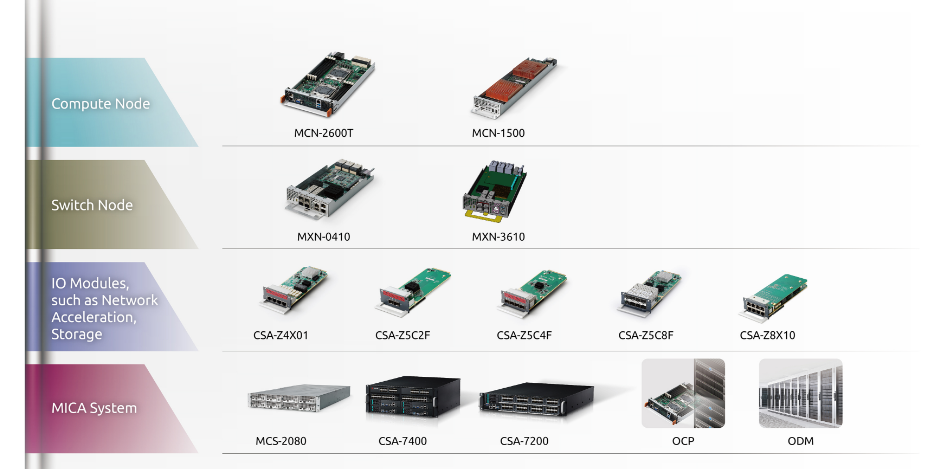Industrial grade design enables reliable Modular Industrial Cloud Architecture platforms
Modular Industrial Cloud Architecture is designed to meet industrial cloud computing requirements, in addition to supporting the latest data center technologies, and taking the specific requirements of carrier grade ICT equipment into consideration. For example, all compute nodes, switch nodes and storage modules are designed to be redundant and hot-swappable. Combined with appropriate high availability middleware, Hot standby and fail-over can be achieved for the “five nines” requirement of telecommunications. Modular Industrial Cloud Architecture IO modules support advanced LAN bypass features, and the bypass modes of each IO module can be set independently through BIOS or an IPMI interface.
For the high bandwidth requirements of network security and DPI-based applications, each Modular Industrial Cloud Architecture compute node can support 64G dual channel communication links to redundant switch nodes, and additional bandwidth requirements can be achieved through the use of network IO cards. A single Modular Industrial Cloud Architecture compute node can support a maximum communication bandwidth of up to 480G. Modular Industrial Cloud Architecture also provides a wide range of network interface modules supporting 1G/10G communications with both optical and electrical interfaces.
NFV and SDN support to meet the core requirements of cloud computing
NFV technology can divide one physical appliance into multiple virtualized machines that are logically separated from each other, meeting the requirements for equipment rental scenarios in a cloud environment. In addition to supporting Intel® VT-x, VT-d and VT-c technologies, Modular Industrial Cloud Architecture also includes support for GPU virtualization for video processing, enabling the sharing of GPU resources among multiple virtual machines and assisting in the deployment of subscription-based video services, such as video conferencing, Internet set-top boxes, and virtual desktops.
SDN technology, used to separate the control plane and forwarding plane, can improve data flow manageability in a cloud environment. Together with NFV technology, SDN can help implement the allocation of network resources on demand, enabling flexible network deployment, imposing finer QoS control of the service data flow, meeting the requirements for a satisfying end-to-end service experience and efficient network operation. Modular Industrial Cloud Architecture switch nodes adopt the latest switch chipset technology using a larger TCAM table and can implement L2/L3/L4 forwarding based on OpenFlow protocol, meeting the requirements for software defined flow forwarding.
Hardware acceleration design allows Modular Industrial Cloud Architecture to use computing resources more efficiently
Modular Industrial Cloud Architecture is designed for industrial ICT computing and can speed up network packet and video processing using the latest hardware acceleration technologies. For NFV, Modular Industrial Cloud Architecture switch nodes support hardware-based acceleration for the processing of Network Virtualization using Generic Routing Encapsulation (NVGRE) and Virtual Extensible LAN (VXLAN), benefiting the construction of a large layer 2 network in a cloud.
For network packets, Modular Industrial Cloud Architecture compute nodes use the acceleration engine in the network controller to implement load balancing and packet filtering against the input data flow without taking up CPU resources. By integrating IO modules that use chipsets with Intel® Quick Assist Technology, Modular Industrial Cloud Architecture can also offload compression/decompression, or encryption/ decryption processing tasks to the IO module. For video processing, Modular Industrial Cloud Architecture can take advantage of the Intel® Quick Sync Video acceleration unit embedded inside supporting processors, boosting video encoding/decoding and video analytics performance.












